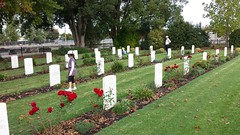At this morning’s ANZAC dawn service in Albury, and undoubtedly in many other places, we peacefully observed a minute’s silence. It’s a sign of respect, and so simple that’s its power remains.

The death of a soldier seems, so often, needless. Perhaps the battle was a failure (as for the ANZAC side of Gallipoli). Perhaps the death in service was far from any battle (as for a number buried in Albury’s military cemetery who died in a level-crossing accident). And even if the battle was decisive, loved ones still ask, ‘Why him?’
The minute of silence, at first blush, looks the same – near useless. What, just a minute? And all we do is, well, nothing? How can that honour the dead?
But the deeper we go into that brief minute, the more profound it becomes. We realise we are doing nothing because there is nothing that we can do to adequately mourn a death – the lives and deaths we remember were indeed great, after all.
And we discover that one minute is not a desultory gift. We find this minute to be but one example of time, and all time is now marked by the death of those service personnel. It is not a minute different from the rest of time, but a minute to show how all time is now different.
Finally, a minute to think also allows us to ask: Would we put ourselves in such a position of danger? We wonder what reasons could move us to risk all in the same way (if we are not already in such a position). For me, at least, I realise how significant was the life of all who freely took on such risk.
I tend not to make comparative links between defence deaths and Jesus’ death for our sins, and will not make that comparison here. Instead, I think the minute of observed silence makes a different comparison: it compares human to human, uniting us as those who face our common enemy, the grave.
At its most potent, the minute’s silence is a minute’s humanity.
